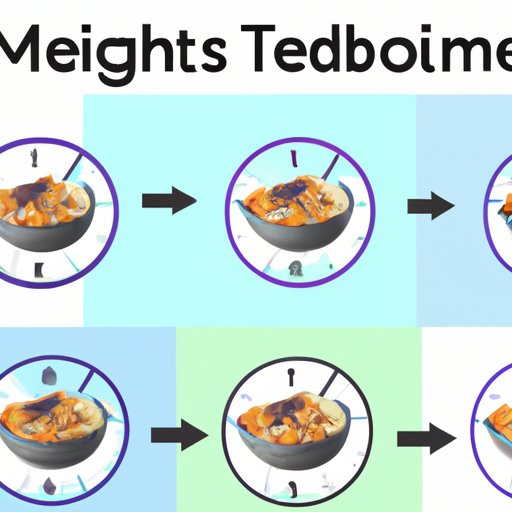Introduction
When it comes to losing weight, there are countless diets, meal plans, and advice out there. With so many opinions and conflicting information, it can be difficult to know what’s best for your body. One of the most common questions people have when trying to lose weight is how often they should be eating. In this article, we’ll explore the science behind eating regularly, meal timing, and intermittent fasting to help you make an informed decision about your diet.

Exploring the Benefits of Intermittent Fasting for Weight Loss
Intermittent fasting is a popular weight loss strategy that involves alternating between periods of eating and fasting. During fasting periods, you may consume only water or very low-calorie beverages such as tea or coffee. The most common form of intermittent fasting is the 16:8 method, which involves an eight-hour eating window and a 16-hour fasting window each day.
According to a 2019 study published in the journal Nutrients, intermittent fasting may help with weight loss due to its effect on hormones that regulate hunger, such as ghrelin and leptin. The study also found that intermittent fasting may help reduce inflammation, lower cholesterol levels, and improve insulin sensitivity, all of which can contribute to weight loss.
However, there are potential drawbacks to intermittent fasting. For example, some people find it difficult to stick to a strict fasting schedule, and it can be hard to get enough nutrients if you’re limiting your eating window. Additionally, intermittent fasting isn’t recommended for pregnant or breastfeeding women, children, and people with certain medical conditions.
The Science Behind Eating Frequently to Maximize Weight Loss
Eating frequently throughout the day has been shown to be beneficial for weight loss. A 2014 study published in the American Journal of Clinical Nutrition found that eating six small meals a day was more effective at reducing body fat than three larger meals. The study also found that eating smaller meals more often increased feelings of fullness and satisfaction.
Several factors affect how long food stays in the body, including the type of food consumed, the amount of fiber and protein, and the size of the meal. Eating smaller meals more frequently can help keep blood sugar levels stable, which can lead to fewer cravings and less overeating. Additionally, eating regularly can help prevent hunger, which can make it easier to stick to a healthy diet.
Regularly eating healthy foods can also provide long-term benefits. A 2018 study published in the journal Appetite found that people who ate a balanced breakfast every day had better overall dietary quality and were more likely to meet their daily nutrient requirements. Eating regular meals can also help support a healthy metabolism, which can lead to improved energy levels and better overall health.

How Meal Timing Impacts Weight Loss
Meal timing can also affect weight loss. Research suggests that eating earlier in the day can help with weight loss. A 2017 study published in the International Journal of Obesity found that people who ate the majority of their calories earlier in the day lost significantly more weight than those who ate later in the day.
There are several strategies for choosing the right meal timing for weight loss. For example, you could try eating a larger breakfast and lunch and a smaller dinner, or focus on eating within a 12-hour window each day. It’s also important to plan ahead and make sure you’re getting enough nutrients throughout the day.
However, there are potential pitfalls to certain meal timing strategies. For example, skipping breakfast can lead to overeating later in the day and not getting enough essential nutrients. Additionally, eating too late at night can lead to indigestion and poor sleep quality, which can both impact your ability to lose weight.

Uncovering the Pros and Cons of Eating Smaller Meals More Often
Eating smaller meals more often can be beneficial for weight loss. A 2011 study published in the journal Obesity Reviews found that eating multiple small meals throughout the day can help reduce hunger and increase feelings of fullness, which can lead to decreased calorie intake and improved weight loss results.
However, there are challenges associated with eating smaller meals more often. It can be difficult to fit multiple small meals into a busy schedule, and you may need to plan ahead to make sure you’re getting enough nutrients. Additionally, eating too many high-calorie snacks can lead to weight gain, so it’s important to choose healthy, nutrient-dense options.
There are several strategies for making small meals work. For example, you could prepare meals in advance and store them in the fridge or freezer. You could also create a meal plan that includes healthy snack options, such as nuts, seeds, fruit, and veggies. Additionally, it’s important to listen to your body and stop eating when you’re full.
Strategies for Eating Regularly Without Gaining Weight
Eating regularly can help with weight loss, but it’s important to control portion sizes and avoid overeating. A 2016 study published in the journal Obesity Reviews found that people who ate larger portions of food were more likely to gain weight over time. To control portion sizes, you could measure out single servings of food or use smaller plates and bowls.
It’s also important to be mindful while eating to avoid overeating. A 2015 study published in the journal Appetite found that mindful eating practices, such as paying attention to hunger cues, can help reduce calorie intake and improve weight loss results. Additionally, being mindful while eating can help you savor your food and enjoy mealtimes more.
Conclusion
In conclusion, understanding how often to eat to lose weight can be a challenge. However, research suggests that eating frequently and controlling portion sizes can help with weight loss. Additionally, meal timing and intermittent fasting can be beneficial, though there are potential drawbacks to both approaches. Ultimately, it’s important to find a strategy that works for your body and lifestyle.
(Note: Is this article not meeting your expectations? Do you have knowledge or insights to share? Unlock new opportunities and expand your reach by joining our authors team. Click Registration to join us and share your expertise with our readers.)
